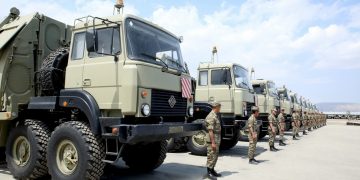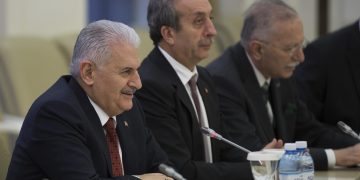On 18 August Minister of Economy of Turkey Nihat Zeybekci stated that Turkey intends to sign a customs agreement with the Eurasian Economic Union.
«We have a proposal to start negotiations on signing of the customs agreement with the EEU, without violating the relevant agreement with the European Union. Turkey also wants to cooperate with the EEU in a different form»,– zaid Zeybekci, as quoted by Novosti information agency.
Though it is not the first statement by the Turkish official about the possibility of creation of similar format for cooperation between Turkey and EEU, and after the meeting between Erdogan and Putin in Sochi in May this year, the minister expressed the hope that it will contribute to a more rapid development of relations between Turkey and the EEU, nevertheless, Zeybekci’s latest statement caused another wave of discontent in Armenia.
A day after the statement RA Deputy Foreign Minister Shavarsh Kocharyan, in his comment to one of the Armenian news agencies, described such “intention of Turkey” as “absurd.”
«Firstly, the possibility of accession to the customs territory of the EEU is not envisaged by the treaty on EEU. Moreover, it is absurd when Turkey says about accession to the customs territory of the EEU, the country, which unilaterally closed the Armenian-Turkish border, the only land border between Turkey and the customs territory of the EEU», said Kocharyan. This statement was used by other media, including the program “Agenda” of the Public Television Company, stressing that “Turkey cannot join the EEU”.
However, Kocharyan’s statement, which clearly contains false information, is no less “absurd”. The treaty on EEU not only provides for the creation of a free trade zone between the union and third countries, the so-called signing of a customs agreement (Article 35 of the treaty on Eurasian Economic Union), but there is already a country with which the EEU signed the corresponding agreement.
On October 5, 2016, the free trade agreement between the EEU and Vietnam came into effect, according to which Vietnam received privileged access to the common market of the five member countries. Moreover, in the near future similar consultations will begin with Egypt. A few days ago in Moscow, after a meeting with the Minister of Foreign Affairs of Egypt, Russian Foreign Minister Sergei Lavrov expressed the hope that these consultations would be followed by “full-fledged negotiations”. According to the same logic, if the corresponding agreement is reached, any other country may have a free trade zone with this union, including Turkey, if the parliaments of the EEU member states approve it.
Consequently, Deputy Foreign Minister Shavarsh Kocharyan, allegedly trying to express a tough stance, disseminated misinformation about the treaty on the EEU. Perhaps official Yerevan will not sign or ratify the free trade agreement between Turkey and the EEU, but the treaty on the EEU, in spite of Kocharyan’s statement, provides for the signing of similar agreements.
Addition: In the material, we have assumed that Turkey’s Minister of Economy meant “the free trade agreement” when saying “customs agreement” because previously Minister Zeybekci had already talked about EAEU-Turkey free trade agreement. Moreover, as the free trade agreement regulates the customs procedures, it is often called the “customs agreement” in order to make it more clear for wide circles of he public.

 FACTOMETER
FACTOMETER









